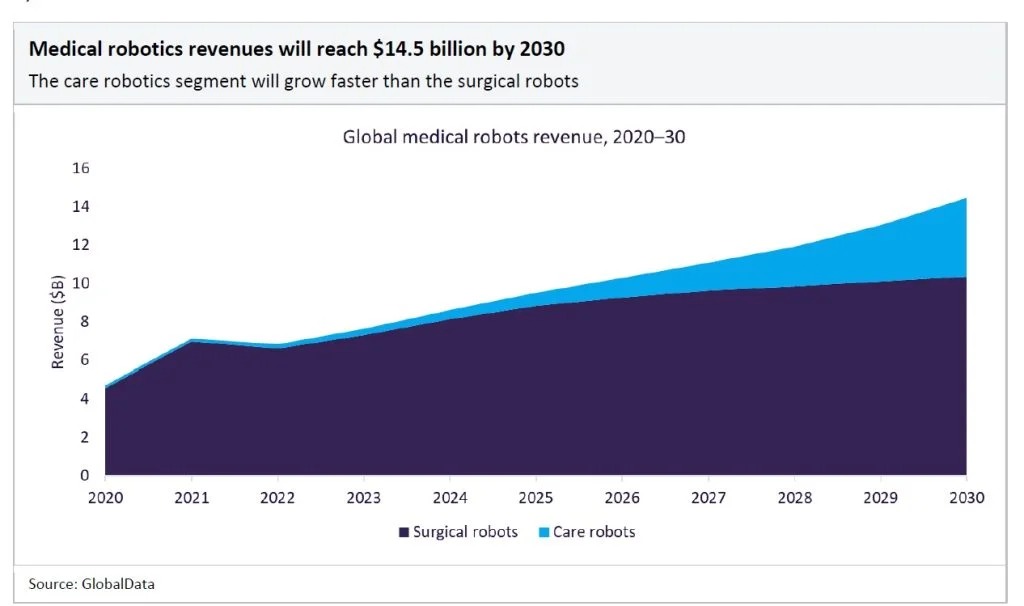Company Insight
Sponsored by Alleima
Key strategies that are moving medical device innovation to the next generation
The digitalisation of healthcare has given a boost to the field of medical innovation. But how can the sector tackle supply chain issues, regulatory changes and pricing pressures to enter the next frontier in development?
The fields of healthcare and technology are continuously evolving and merging to create exciting possibilities in medical device innovation. The proliferation of wearable devices, remote health monitoring, and the rise of artificial intelligence (AI), machine learning (ML) and robotics are creating medical developments to mirror the growing consumer needs. And according to the Medical Device Predictions 2023 report by GlobalData, innovation will be the deciding factor in the success and survival of leading medical device companies by 2030.
“The pace of innovation has increased in the past few years, and even more so since the onset of the COVID pandemic,” says Cacie McDorman, PhD, engineering manager, BU Medical NAFTA at leading medical wire-based component manufacturer Alleima. Improved technology and the introduction of rapid prototyping into R&D has helped speed up the development process. Medical devices are now in the same world as technology, as far as consumer expectations with new software features and improved capabilities.”

Advances in technologies such as AI and cloud computing are making way for innovation in surgical robotics, which will see better clinical outcomes and reduce the workload for healthcare providers. Furthermore, manufacturers continue to improve robot design so that they are more efficient through innovations in engineering and metallurgy.
According to Tina Deng, medical device principal analyst at GlobalData: “Surgical robots are designed to solve the limitations currently present in minimally invasive surgeries, as well as to improve outcomes in open surgical procedures. These systems are utilised in a variety of surgical procedures, including cardiovascular, general surgery, orthopaedic, neurosurgery, obstetrics, gynaecology, and more. According to GlobalData forecasts, the total surgical robotics market was worth $4.6B in 2020 globally. By 2030, it will have grown at a strong compound annual growth rate (CAGR) of 8.5% to $10.3B, bolstered with the coming marriage of artificial intelligence (AI) and robotics within medical devices.”
“Economic downturns can also create a demand for more cost-effective solutions in healthcare. This could lead to increased interest in surgical robotics systems, as they offer greater efficiency and cost savings compared to traditional surgical methods. Robotic surgery systems allow surgeons to operate with greater precision, reduce complications, and result in faster recovery periods. Because robotic surgery is less invasive, patients typically require shorter hospital stays than they would with traditional open surgery.”
What’s the next big innovation?
In the post-pandemic era, the demand for digitalised medical devices and remote patient monitoring systems continues to rise steadily. Healthcare manufacturers that are ahead of the curve are utilising cloud-based technologies and portable devices anticipating a boom in the field of digital therapeutics (DTx) and precision medicine.
From remote surgery to streamlining clinical trial designs and more, AI and ML also have the potential to lead medical device innovations, and GlobalData estimates that the AI industry will be worth $93bn in 2023. In particular, the use of robots in the healthcare sector in sync with ML technology has led to improved patient outcomes.
“ML is also currently used in things like insulin dosing machines, which dose patients with insulin before experiencing physiological reactions. This type of ML is heavily influencing innovations in healthcare. It not only allows for proactive treatment but also more individualised treatment,” adds McDorman.
So, while manufacturers continue to push the envelope on innovative medical concepts, the success of the sector also hinges on how well it handles the challenges at this juncture.
Striking a balance
While the innovative progress in the medical sector is on the upswing, manufacturers and med tech companies are still facing obstacles.
Many medical device manufacturers rely on suppliers and sub-suppliers for the finished product, so delays in the supply chain are inevitable. This in turn slows down the R&D process of creating samples, and prototypes. It can be difficult, then, to control the timeline of when the product hits the market.
Pricing pressures and regulatory changes, meanwhile, present more impediments in the field of medical device innovation. But the key to tackling these issues is forming innovation partnerships. Manufacturers that are experienced in regulatory know-how and have a robust supply chain will be better equipped to advance medical device innovation.
A step forward
A one-stop-shop approach such as Alleima’s can be crucial to tackling the issues in medical device innovation. Alleima manufactures made-to-order custom medical wire, wire-based components, and nitinol instruments that are widely used in remote patient monitoring systems. According to McDorman: “Alleima is helping to alleviate these issues by offering added services to our Exera® medical wire such as stranding, coiling, grinding, braiding, cutting to length, stripping, and forming.
“Our expert engineering team works closely with our customers to provide them with exactly what they need for their medical devices. Our engineers are not afraid of the impossible. We have helped various customers achieve their end-product when others could not.”
A detailed plan for navigating the medical device innovation landscape is the need of the hour. Go to the Alleima microsite on the Medical Device Network platform to learn more and download their latest whitepaper on the subject at here.
Contact information
Alleima Advance Materials
1 Commerce Blvd.,
Palm Coast, FL, 32164,
United States
Tel: +1 386 445-2000
Fax: +1 386 447-5113
Email:ms.spc@alleima.com
Alleima Tucson
2424 East Aragon Rd
Tucson, AZ 85756
United States
Tel: +1 520 495 5927
Alleima Zug
Oberallmendstrasse 20a
CH-6300 Zug
Tel: +41 41 761 63 55
Email: sales@alleima.com
Alleima St Imier
Rue de Beau Site 8
CH-2610 Saint-Imier
Tel: +41 32 942 39 20
Email:info@alleima.com